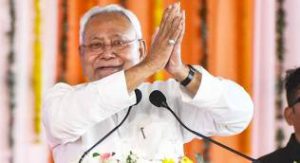Qalam Times News Network | Patna
Reservation for native women in Bihar’s government jobs has taken center stage just months ahead of the upcoming state assembly elections. Chief Minister Nitish Kumar, in a major policy announcement following a cabinet meeting on Tuesday, declared that 35% of all government vacancies in the state will now be reserved exclusively for women who are domiciled in Bihar. The decision, which is being seen as both a social reform and a strategic electoral move, is aimed at amplifying the presence of women in state administration.

This reservation policy will apply across all levels and categories of direct recruitment in the state’s public sector. Nitish Kumar described it as a “bold step toward empowering women,” adding that the initiative is meant to ensure stronger representation of women in governance and public life. However, the benefits of this quota will be limited strictly to women who are permanent residents of Bihar, reinforcing the state’s domicile policy. With only three months remaining before the model code of conduct comes into effect, the practical implementation of the policy before elections remains uncertain.
The announcement is being interpreted as part of a broader strategy to consolidate the support of female voters, a demographic that Nitish’s JD(U) has historically engaged through policies like 50% reservation for women in panchayats and the popular “Jeevika” program. This new initiative could especially resonate with educated women from rural and urban areas who aspire for public sector employment—a traditionally coveted career path in Bihar.
Youth Commission for Employment and Education
Alongside the reservation announcement, the Bihar cabinet approved the formation of a Bihar Youth Commission, a statutory body focused on the welfare and employment opportunities for the state’s young population. The commission will include a chairperson, two vice-chairpersons, and seven members—all under the age of 45. Its role will be to coordinate with various departments to ensure better education, job opportunities, and to safeguard the rights of students and laborers working or studying outside Bihar.
The cabinet cleared 43 proposals during the meeting, many of which pertain to employment, youth development, and agriculture relief.
Political Ramifications
Nitish Kumar’s reservation move is likely to impact electoral dynamics in the 2025 assembly elections. Women comprise a substantial portion of Bihar’s voter base, and JD(U)’s consistent focus on women-centric policies has historically brought them electoral dividends. By offering direct employment advantages, this new policy may strengthen JD(U)’s appeal among women voters, particularly from economically and socially disadvantaged communities like the Extremely Backward Castes (EBCs) and Mahadalits.
However, the policy could also face resistance from several quarters. Young male aspirants, already struggling with limited job opportunities and affected by existing caste-based quotas, may see this as another blow. The opposition may capitalize on this sentiment, portraying the policy as a last-minute electoral gimmick with little chance of immediate implementation. Moreover, limiting the benefits to Bihar-native women could trigger debates about the fairness of the domicile requirement, especially among candidates from neighboring states.
The eventual success of this policy—politically and administratively—will depend heavily on the government’s execution and communication. If effectively rolled out before the elections, it could give JD(U) a significant edge, especially when combined with youth-focused initiatives like the newly proposed commission.
Nonetheless, Bihar’s complex socio-political landscape, caste equations, and the dynamics within the JD(U)-BJP alliance will all play a role in determining whether this policy becomes a true game-changer or just another campaign headline. The opposition, and indeed the public, will inevitably ask: how many women actually receive jobs under this reservation before the elections?






